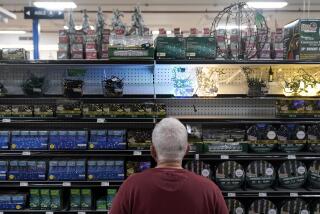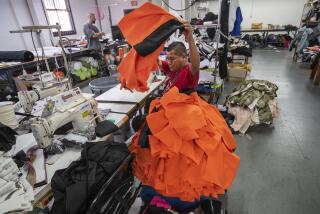Defense Orders Soften Drop in Durable Goods
- Share via
WASHINGTON — Orders for “big ticket” durable goods edged down 0.1% in September and would have fallen even further except for the second biggest increase in defense orders on record, the government reported Tuesday.
The Commerce Department said orders for durable goods, items expected to last three or more years, dropped by $147 million last month to a seasonally adjusted $126.68 billion following a 3.9% rise in August.
Without a huge 56.3% surge in defense orders, the weakness in manufacturing would have been even more pronounced. Excluding defense, orders would have fallen by 3.9%, the biggest decline in civilian demand since May.
Analysts attributed the big jump in military demand to a rush by the Pentagon to place orders in September, the last month of the government’s budget year. They said the weakness in the civilian categories provided fresh evidence that U.S. manufacturing is headed into a slowdown.
“This is a weak report showing that the industrial sector has lost momentum,” said Bruce Steinberg, an economist at Merrill Lynch. “The only thing that held orders up in September was defense, and that category is volatile and not indicative of underlying economic trends.”
In September, manufacturing employment took its biggest nose-dive in seven years, and many economists predicted that the weak orders report would lead to more layoffs in coming months.
“This report points to a sharp slowdown in industrial activity during the final quarter” of the year, said Gordon Richards, senior economist at the National Assn. of Manufacturers.
Many economists pointed to a big 5.6% drop in demand for non-defense capital goods in September as a particularly ominous sign, especially since it followed an even larger 10.3% August decline.
This area, which reflects business investment plans, has been one of the key sources of strength during the past year.
David Wyss, chief financial economist at DRI-McGraw Hill, said he believed that the country would be able to avoid an outright recession in the coming year but that the economy had entered a period of very sluggish growth with the unemployment rate likely to rise from its current 5.3% to perhaps 5.7% by next summer.
“We are not going to have a recession, in part because the Federal Reserve is easing credit conditions, but we will have a very significant slowdown in the economy,” Wyss said.
More to Read
Inside the business of entertainment
The Wide Shot brings you news, analysis and insights on everything from streaming wars to production — and what it all means for the future.
You may occasionally receive promotional content from the Los Angeles Times.










